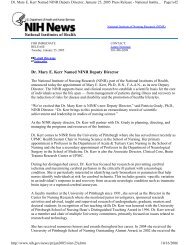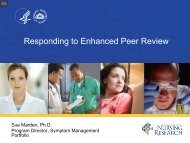Ethical Challenges of Palliative Care Research - National Institute of ...
Ethical Challenges of Palliative Care Research - National Institute of ...
Ethical Challenges of Palliative Care Research - National Institute of ...
You also want an ePaper? Increase the reach of your titles
YUMPU automatically turns print PDFs into web optimized ePapers that Google loves.
Vol. 25 No. 4 April 2003 Journal <strong>of</strong> Pain and Symptom Management S3<br />
Preface<br />
<strong>Ethical</strong> <strong>Challenges</strong> <strong>of</strong> <strong>Palliative</strong> <strong>Care</strong> <strong>Research</strong><br />
David J. Casarett, MD, MA, Ann Knebel, PhD, and Karin Helmers, PhD<br />
Center for Health Equity <strong>Research</strong> and Promotion (D.J.C.), Philadelphia Veterans Administration<br />
Medical Center, and Division <strong>of</strong> Geriatrics (D.J.C.), University <strong>of</strong> Pennsylvania, Philadelphia,<br />
Pennsylvania; and <strong>National</strong> <strong>Institute</strong> <strong>of</strong> Nursing <strong>Research</strong> (A.K., K.H.), Department <strong>of</strong><br />
Health and Human Services, <strong>National</strong> <strong>Institute</strong>s <strong>of</strong> Health, Bethesda, Maryland, USA<br />
Address reprint requests to: David J. Casarett, MD, University<br />
<strong>of</strong> Pennsylvania, 3615 Chestnut Street, Philadelphia,<br />
PA 19104, USA.<br />
Recent years have seen a dramatic increase<br />
in palliative care research, broadly defined as<br />
research related to understanding and improving<br />
the quality <strong>of</strong> life <strong>of</strong> patients near the end<br />
<strong>of</strong> life. This new field <strong>of</strong> research has produced<br />
a variety <strong>of</strong> ethical concerns for investigators,<br />
clinicians, hospices, and Institutional Review<br />
Boards (IRBs). 1–8 Broadly, these concerns can<br />
be divided into concerns about the informed<br />
consent process and concerns about the risks,<br />
potential benefits, and burdens that are created<br />
by a study’s design.<br />
At the heart <strong>of</strong> all <strong>of</strong> these concerns is the<br />
question <strong>of</strong> whether palliative care research<br />
creates ethical challenges that are new, or<br />
which are unique to this field. The answer to<br />
this question will have important implications<br />
for the design and conduct <strong>of</strong> palliative care research.<br />
If palliative care research does, in fact,<br />
raise unique ethical issues, then special restrictions,<br />
protections, and guidelines should be<br />
considered. If it does not, then the strategies<br />
devised by investigators in other fields will suffice<br />
to protect subjects and special guidelines<br />
are not necessary. In that case, any guidelines<br />
that are established for palliative care research<br />
should consist largely <strong>of</strong> recommendations imported<br />
from other fields.<br />
This workshop was convened in order to define<br />
ethical aspects <strong>of</strong> palliative care research<br />
that are unique, or different than, other kinds<br />
<strong>of</strong> research involving different populations,<br />
and which warrant special guidelines, procedures,<br />
or restrictions. This workshop brought<br />
together researchers and clinicians familiar with<br />
the ethical challenges <strong>of</strong> palliative care research,<br />
listed on a following page. Held on the <strong>National</strong><br />
<strong>Institute</strong>s <strong>of</strong> Health campus on September 12<br />
and 13, 2002, this conference was co-sponsored<br />
by the <strong>National</strong> <strong>Institute</strong> <strong>of</strong> Nursing <strong>Research</strong><br />
(NINR) and the Office <strong>of</strong> Rare Diseases<br />
(ORD). In addition, generous support for publication<br />
and dissemination was provided by a<br />
Presidential Award from the Greenwall Foundation.<br />
The articles that follow this introduction were<br />
the focus <strong>of</strong> heated discussion and debate over<br />
the two-day conference, with critical input and<br />
revisions suggested by the workshop participants.<br />
Throughout the workshop, several key<br />
points emerged that are summarized below. Although<br />
it would be incorrect to claim that<br />
these points represent an absolute consensus<br />
<strong>of</strong> the workshop participants, they do, however,<br />
represent ideas and positions that most<br />
participants were willing to support.<br />
<strong>Ethical</strong> <strong>Challenges</strong> Related to Informed<br />
Consent in <strong>Palliative</strong> <strong>Care</strong> <strong>Research</strong>:<br />
Key Points<br />
1. Additional scrutiny <strong>of</strong> informed consent<br />
for palliative care research should not<br />
come at the cost <strong>of</strong> decreased attention to<br />
research that involves other populations<br />
that may be equally vulnerable. Informed<br />
consent deserves close scrutiny in all clinical<br />
research, not only research that involves<br />
patients near the end <strong>of</strong> life.<br />
© 2003 U.S. Cancer Pain Relief Committee 0885-3924/03/$–see front matter<br />
Published by Elsevier. All rights reserved.<br />
doi:10.1016/S0885-3924(03)00058-7
S4 Casarett et al. Vol. 25 No. 4 April 2003<br />
2. This population is heterogeneous with respect<br />
to prospective subjects’ ability to<br />
give voluntary consent to research participation.<br />
Patients near the end <strong>of</strong> life are<br />
not inherently less able to give voluntary<br />
consent to palliative care research than<br />
are other patient populations. Instead, assessments<br />
<strong>of</strong> voluntariness should be based<br />
on patient characteristics, patients’ relationships<br />
with study representatives, and<br />
the institutional setting, just as they are<br />
for other forms <strong>of</strong> research.<br />
3. This population is also diverse with respect<br />
to decision-making capacity, and blanket<br />
prescriptions about safeguards and assessments<br />
<strong>of</strong> capacity are not useful. Instead,<br />
additional assessments <strong>of</strong> capacity should<br />
be based on patient population characteristics,<br />
and the balance <strong>of</strong> risks and potential<br />
benefits posed by a study.<br />
4. Because <strong>of</strong> the rapid time course <strong>of</strong> many<br />
terminal illnesses, and fluctuations in<br />
cognitive status, palliative care research<br />
<strong>of</strong>fers a good setting for the use <strong>of</strong> advance<br />
consent. This is particularly true<br />
when studies pose greater than minimal<br />
risks, when they do not <strong>of</strong>fer potential<br />
benefits, or both. When advance consent<br />
is employed, reconsent is important in<br />
the event that subjects regain capacity.<br />
5. For some studies in which increasing cognitive<br />
impairment is likely, the consent<br />
process may include a discussion <strong>of</strong> a patient’s<br />
willingness to continue participation<br />
if capacity is lost.<br />
Designing <strong>Palliative</strong> <strong>Care</strong> <strong>Research</strong><br />
That Maximizes Potential Benefits<br />
and Minimizes Risks and Burdens:<br />
Key Points<br />
1. Institutional Review Boards that frequently<br />
review palliative care research should include<br />
members who are familiar with the<br />
care <strong>of</strong> patients near the end <strong>of</strong> life and<br />
who can assess the risks, potential benefits,<br />
and value <strong>of</strong> proposed research.<br />
2. Regardless <strong>of</strong> the study design used to assess<br />
the efficacy <strong>of</strong> symptom intervention<br />
strategies, it is essential that investigators<br />
provide adequate “breakthrough” or “rescue”<br />
therapy and that they measure “rescue”<br />
endpoints as accurately as possible.<br />
3. It is not necessary that investigators inform<br />
prospective subjects that they are<br />
believed to be near the end <strong>of</strong> life, either<br />
in the consent process or throughout<br />
data collection. This omission should not<br />
be considered “deception” that requires<br />
additional IRB review and oversight.<br />
4. The sensitive nature <strong>of</strong> certain kinds <strong>of</strong><br />
data collected in the course <strong>of</strong> palliative<br />
care research, particularly data regarding<br />
assisted suicide, may warrant certificates<br />
<strong>of</strong> confidentiality from the Department <strong>of</strong><br />
Health and Human Services.<br />
5. In general, interviews <strong>of</strong> patients near the<br />
end <strong>of</strong> life and bereaved family members<br />
need not cause significant distress, and<br />
are <strong>of</strong>ten valued by subjects. Studies that<br />
employ interviews with these groups should<br />
not necessarily be subjected to additional<br />
scrutiny or restrictions but should instead<br />
employ mechanisms to assess and manage<br />
distress if it occurs.<br />
6. There are insufficient data to make recommendations<br />
about appropriate and inappropriate<br />
timing <strong>of</strong> recruitment and data<br />
collection from bereaved family members.<br />
However, most participants felt that the<br />
time frame that is currently used for most<br />
studies (1 to 3 months) is acceptable.<br />
7. Quality Improvement activities are essential<br />
in improving the care <strong>of</strong> patients near<br />
the end <strong>of</strong> life. Efforts to protect the<br />
rights and welfare <strong>of</strong> patients involved in<br />
these activities should balance the need<br />
for protections against the ethical imperative<br />
to improve care.<br />
Conclusion<br />
<strong>Research</strong> on issues at the end <strong>of</strong> life is rapidly<br />
growing, and its importance increases as<br />
our population ages. There is an urgent need<br />
to find better ways to improve pain and symptom<br />
management at the end <strong>of</strong> life, to help<br />
people die with dignity, and to comfort the bereaved.<br />
Although this research is important, it<br />
is not without ethical challenges. Therefore,<br />
efforts to improve the standard <strong>of</strong> palliative
Vol. 25 No. 4 April 2003 <strong>Ethical</strong> <strong>Challenges</strong> <strong>of</strong> <strong>Palliative</strong> <strong>Care</strong> <strong>Research</strong> S5<br />
care through research and through quality improvement<br />
activities must be sensitive to ethical<br />
concerns.<br />
In summary, conference participants agreed<br />
that the ethical issues raised by palliative care<br />
research are, for the most part, not unique to<br />
this field. The principles <strong>of</strong> ethical research<br />
conduct that guide other forms <strong>of</strong> research can<br />
and should be applied to this field. 3 For instance,<br />
the consent process should be careful<br />
and thoughtful, with adequate attention given<br />
both to an individual’s decision-making capacity<br />
and the voluntariness <strong>of</strong> his or her decision.<br />
Similarly, investigators should pay close attention<br />
to a study’s design, to ensure that it <strong>of</strong>fers<br />
an optimal balance <strong>of</strong> risks, burdens and potential<br />
benefits. 9 Finally, as with any research, a<br />
study is only ethically sound if its risks are reasonable<br />
in proportion to its potential benefits,<br />
and the knowledge to be gained. Thus, palliative<br />
care researchers, like researchers in other<br />
fields, must demonstrate that their research<br />
questions are important, their methods are appropriate<br />
to produce valid results, and that<br />
their findings will be generalizable.<br />
Acknowledgments<br />
The conference co-chairs, David Casarett,<br />
MD, MA, Ann Knebel, PhD, and Karin Helmers,<br />
PhD, gratefully acknowledge financial support<br />
from the <strong>National</strong> <strong>Institute</strong> <strong>of</strong> Nursing <strong>Research</strong>,<br />
the Office <strong>of</strong> Rare Diseases, and from<br />
the Greenwall Foundation, as well as the enthusiastic<br />
discussion and debate among the<br />
conference participants:<br />
Manish Agrawal, MD<br />
Gloria Bonner, PhD, RN<br />
Miriam E. Cameron, PhD, RN, MS<br />
Grace H. Christ, DSW<br />
Stephen Connor, PhD<br />
Barbara J. Daly, PhD, RN, FAAN<br />
Evan G. DeRenzo, PhD<br />
Jacqueline Dunbar-Jacob, PhD, RN, FAAN<br />
Perry G. Fine, MD<br />
Christine Grady, PhD, RN, FAAN<br />
David Introcaso, PhD<br />
Jason Karlawish, MD<br />
Barbara A. Koenig, PhD, RN<br />
Patrick McNeilly, PhD<br />
Marie T. Nolan, DNSc, RN<br />
Marian Secundy, PhD<br />
James A. Tulsky, MD<br />
Dave Wendler, PhD<br />
References<br />
1. Mount B, Cohen R, MacDonald N, Bruera E,<br />
Dudgeon D. <strong>Ethical</strong> issues in palliative care research<br />
revisited. Pall Med 1995;9:165–170.<br />
2. de Raeve L. <strong>Ethical</strong> issues in palliative care research.<br />
Pall Med 1994;8(4):298–305.<br />
3. Casarett D, Karlawish J. Are special ethical guidelines<br />
needed for palliative care research? J Pain<br />
Symptom Manage 2000;20:130–139.<br />
4. Casarett D. Beyond vulnerability: the ethics <strong>of</strong><br />
end-<strong>of</strong>-life research. J Pain Symptom Manage 1999;<br />
18:143–145.<br />
5. Casarett D, Kirschling J, Levetown M, et al.<br />
NHPCO Task Force Statement on Hospice Participation<br />
in <strong>Research</strong>. J Pall Med 2001;4:441–449.<br />
6. Casarett D, Karlawish J, Hirschman K. Are hospices<br />
ready to participate in palliative care research? Results<br />
<strong>of</strong> a nationwide survey. J Pall Med 2001;5:397–406.<br />
7. Crowley R, Casarett D. Patients’ willingness to<br />
participate in symptom-related and disease-modifying<br />
research: results <strong>of</strong> a screening initiative in a palliative<br />
care clinic. Cancer, in press.<br />
8. Casarett DJ, Karlawish J, Sankar P, Hirschman K,<br />
Asch DA. Obtaining informed consent for cancer<br />
pain research: Do patients with advanced cancer<br />
and patients with chronic pain have different concerns?<br />
J Pain Symptom Manage, in press.<br />
9. Department <strong>of</strong> Health and Human Services. Protection<br />
<strong>of</strong> Human Subjects. Title 45 Part 46: Revised.<br />
Code <strong>of</strong> Federal Regulations. 1991 June 18.












